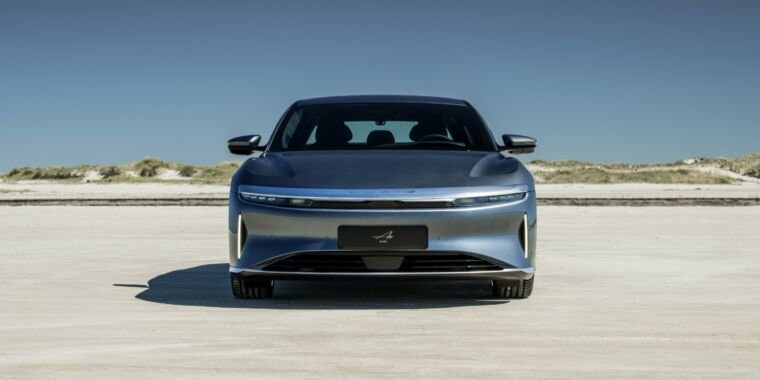Lucid
Lucid has just revealed the details of its model-year 2025 updates, and among the tweaks to its handsome electric sedan is an impressive bump in range efficiency. The entry-level Lucid Air Pure, which starts at $69,900, can now travel 420 miles on a single charge of its 84 kWh battery. That equates to 5 miles/kWh (12.4 kWh/100 km), making the Air Pure the most efficient electric vehicle for sale today.
The range bump is mostly thanks to Lucid making a heat pump standard across the range, after first adding one to the ultra-powerful, ultra-expensive Air Sapphire.
Lucid has also upgraded the computer hardware that oversees the Air’s various subsystems. The automaker says it has tripled processing power and doubled the system’s memory, which should translate to faster and better infotainment. And Lucid has made its advanced driver assistance system standard across the lineup, too.
While the Air Pure might be the first production EV being sold to reach 5 miles/kWh, it isn’t the longest-range Lucid Air for sale. That remains the $110,900 Grand Touring, which can go 512 miles (824 km) on a single charge. The 2025 Lucid Air Touring, which slots between them, has a range of 406 miles (654 km) and starts at $78,900.
While still a relative minnow compared to Rivian, Lucid has been on something of an upward trajectory of late. Price cuts have undoubtedly helped it have a record Q2, delivering 2,394 cars for its best three months so far.
Who did this math?
In addition to claiming 5 miles/kWh for the Air Pure, Lucid also notes in its press release that it has achieved “a record 146 MPGe rating” for the car.
Lucid’s model-year 2025 data isn’t in the EPA’s online fuel economy database yet, so Ars can’t check the slightly more detailed information there (which should break out the MPGe figure into city, highway, and combined figures), but 146 MPGe is only equivalent to 4.3 miles/kWh; 5 miles/kWh is 169 MPGe.
We asked Lucid about the difference, and the company told Ars that with EVs, losses in the charging process from resistance in the cables and from heating the battery make a difference.
“The reason we don’t love MPGe is that batteries are the real expense for EVs—not electricity. If you can be more energy efficient when actually driving, you can reduce the capacity of the battery pack in the vehicles you build—reducing cost, reducing weight, and reducing the natural resources you need per vehicle. On the other hand, it’s nice to minimize energy lost during charging, but if you get only 2.5 mi/kWh on the road, you still are stuck with the big expensive battery pack,” Lucid told Ars.
(This does not change the fact that MPGe is derived by multiplying miles/kWh by 33.7, the amount of energy in a gallon of gasoline.)
Despite the incongruent math, the 2025 Air Pure still beats the 2024 model, which makes do with a combined 140 MPGe and 410 miles of range, according to the EPA.
Source link
